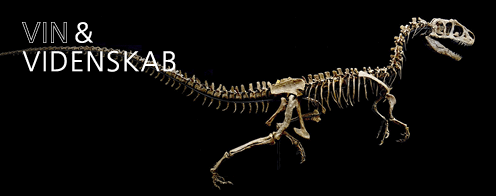
The dinosaurs rediscovered: How a scientific revolution is rewriting history
Foredrag med Vin & Videnskab
MICHAEL BENTON (UK) Professor, palaeontologist, author
NB: Foredraget vil være på engelsk / the talk will be in English.
Our international guest speaker of the season is Professor Michael Benton. He is a leading British palaeontologist and evolutionary scientist who has made fundamental contributions to understanding the history of life. He was one of the experts consulted by BBC in connection with their series Walking with Dinosaurs, and he has published a number of acclaimed books.
His latest book is entitled “The Dinosaurs Rediscovered: How a Scientific Revolution is Rewriting History” (2019) and this will be the topic of his talk at Wine & Science.
Over the past twenty years, our understanding of dinosaurs has changed dramatically and has revealed things that nobody predicted. This is due to remarkable new fossil finds combined with a revolution in the techniques available to analyse fossils. Palaeontologists can now work out the colour of dinosaurs, their bite forces, top speeds, and even how they cared for their young.
Tonight, Michael Benton will give us insights into how far our knowledge of dinosaurs has come. He will present the latest palaeontological evidence, bring us on excavation expeditions as well as into high-tech laboratories, and explore how scientists are able to read the details of the life of the dinosaurs from their fossils.
Host of the evening will be Peter Kjærgaard, Professor of Evolutionary History and Museum Director at the Natural History Museum of Denmark.
A glass of wine will be served during the intermission (included in the price).
About Michael Benton
 MICHAEL BENTON
MICHAEL BENTONProfessor of Vertebrate Paleontology at Bristol University, UK
His research interests include diversification of life, quality of the fossil record, mass extinctions, Triassic ecosystem evolution, basal archosaurs, and the origin of the dinosaurs. A key theme is the Permo-Triassic mass extinction, the largest mass extinction of all time, which took place over 250 million years ago, where he investigates how life was able to recover from such a devastating event.
This connects with the origin of dinosaurs, which now evidently happened earlier than we thought, and at a time of quickening physiology and ecology. After the extinction, mammals and their ancestors and dinosaurs and their ancestors shifted posture to be upright and became warm-blooded, sporting for the first time feathers on the one hand and hair on the other. We think we know the fossils and the major events in the history of life - but sometimes new discoveries and new analytical methods force a major rethink.
Billetter
Billetpriser for Vin & Videnskab
Almindelig billet:
150 kr. (+ gebyr)
Studerende:
110 kr. (+ gebyr)
Studiekort skal fremvises i indgangen sammen med billetten.
Børn og unge (op til 17 år):
110 kr. (+ gebyr)
Billet for årskortholder:
110 kr. (+ gebyr)
Der kan købes én billet pr. årskort.
Kortet skal fremvises i indgangen sammen med billetten.
Særligt for årskort DUO:
Med årskort DUO kan du købe to billetter af typen 'billet for årskortholder' og tage en gæst med til foredrag.
En kombination af almindelige billetter og billetter for årskortholdere kan sagtens bookes i samme transaktion.
Årskort købes i museumsbutikkerne.
Se priser og flere årskortfordele her...
Klippekort
Klippekort til Vin & Videnskab er udgået, men har du klip til overs, kan de fortsat bruges, hvor der ikke er udsolgt.
- Gå ind på Billetto
- Vælg det arrangement, du vil booke plads til
- Tryk på ”Find billetter”
- Vælg ”Pladsreservation for klippekortholdere” og angiv antal pladser, du vil reservere.
Der opkræves ikke betaling, men man skal registrere sig for at få tilsendt sin pladsreservation på e-mail. Medbring reservation og gyldigt klippekort til arrangementet.
Sted og vejvisning

Chr. Hansen Auditoriet
Bygning 34.0.01
Bartholinsgade 4A, 1356 København K
Kontakt
Har du spørgsmål, er du velkommen til at sende en mail til vinogvidenskab@snm.ku.dk.

